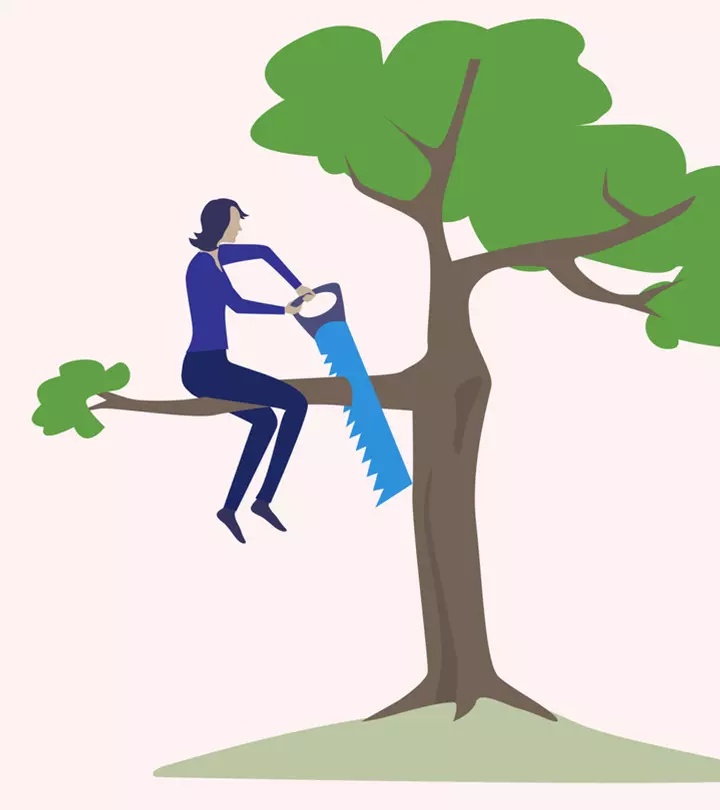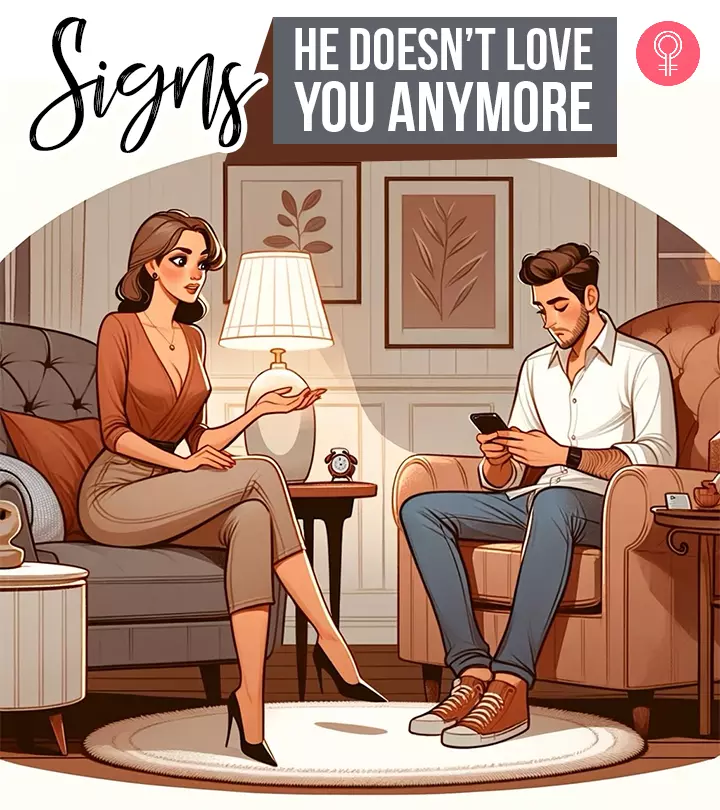14 Signs Your Partner Is Controlling You & How To Deal With It
Keep an eye out for these red flags in your relationship before it gets too late.

Image: Shutterstock
Every toxic relationship has big neon-lit red flags – signs your partner is controlling you. Ask yourself a few simple questions. Is your partner too possessive and constantly micro-managing your every move through surveillance? Do they constantly check who you talk and hang out with? Do they belittle you just to get their way? These are huge red flags that you should not ignore. If you remain in such a toxic relationship, it could even become violent. If you are still unsure that your partner is controlling, keep reading. We explain the different signs of a toxic relationship to watch out for and how you can save yourself from it.
In This Article
What Is A Controlling Relationship?

A relationship where one partner holds the reins constantly and aggressively is called a controlling relationship. The controlling partner tends to always find fault with their other half, using tactics such as manipulation and gaslighting to control the other partner. The controlling partner guilt-trips the other partner to get their way, and they may disregard the other partner’s opinions or feelings, resulting in emotional abuse. They may disregard the other partner’s opinions or feelings consistently, and the relationship may more often than not feel draining.
Natalie Whipppie, an author and blogger, wrote about her experience on her blog of being in an emotionally abusive relationship. She talked about how draining this relationship was for her. She wrote, “People often overlook emotional abuse—no one is getting hit or raped. But I can assure you that emotional abuse is just as damaging (i).”
Age, gender, and sexual orientation do not play a role in deciding who is the controlling partner. The controlling partner may become violent when the other partner does not listen to them. It is clearly a toxic relationship.
Controlling partners manipulate the emotions of the other partner. They do this seamlessly, often using guilt to get their way. They may also mock the other partner when the latter disagrees with them.
Here are some signs that you may be in a controlling relationship.
Key Takeaways
- A controlling relationship is one where one partner dominates and controls the relationship.
- The controlling partner is skillful at manipulating the other’s emotions, often using guilt to achieve their goals.
- They tend to keep you isolated from close friends and family and disregard your opinions and boundaries.
- It is unsafe to remain in a relationship with a controlling partner, and you need to be ready to cut any ties with that person.
- It is important couples continue to evaluate their actions in a relationship consistently. Many people never planned to become controlling. They were just too caring, and soon, they become controlling without knowing it.
Signs Of A Controlling Relationship

1. They Keep You Isolated
One of the most prominent signs of a controlling partner is that they try to keep you to themselves.
They will keep you isolated from your family and friends. While this might not be done out rightly, there are a few subtle hints. If your partner keeps complaining when you speak to your friends or family, it could be a red flag. Another sign of a control freak is that they might just blatantly ask you to stop talking to close friends. The aim of this is to increase your dependence on them and isolate you from your friends and family.
 Quick Tip
Quick Tip2. They Keep A Constant Eye On You
If your partner is extremely particular about where you go and when you get back, it is a sign that they are controlling. They keep tabs on when you go out and how long you spend with your friends or family. They admonish you for spending quality time with others. It feels like you have a curfew that you need to stick to.
3. They Keep A Track Record
A controlling partner keeps track of all your mistakes. They reprimand you constantly for them. But on the other hand, they praise themselves for all the things they do for you. In a healthy relationship, both partners encourage and forgive each other and do not take small arguments seriously.
4. They Violate Your Boundaries
A controlling partner tends to keep tabs on you to the point of even spying on your daily activities. They see no fault in checking your phone without permission or hack into your email accounts. They may snoop around in your stuff and even follow you when you go out. They will make you believe that you have to share everything with them right from the start.
5. They Disregard Your Opinion
Another sign of a controlling partner is that they make you believe that your opinion does not count. They belittle and even joke about your opinions. This is especially true when your opinions don’t align with theirs.
6. They Criticize Everything You Do
If your partner constantly criticizes you for everything you do, that’s a sign of a controlling partner. They might pass it off as a valid criticism, but it stands to reason that if they find fault with everything you do, that’s a problem.
7. Verbal Abuse

Most people consider physical threats as a red flag, but verbal abuse is just as bad. If your partner constantly threatens to leave you or harm themselves to get their own way, it’s a bad sign. Verbal abuse can be mentally and emotionally draining. Another sign is your partner constantly using foul language directed at you.
8. Acceptance On A Conditional Basis
If your partner only appreciates you when you do something for them, it’s a red flag. Love should be freely given, without any strings attached. If your partner is constantly sending you messages that you need to change in order to win favor with them, that’s wrong.
9. They Send You On Regular Guilt Trips
If your partner makes you feel like you treat them terribly, it’s a sign of a controlling relationship. They keep track of your daily activities and use it to guilt-trip you. This is a way to silence you while getting their way.
10. They Are Jealous And Paranoid
If your partner is jealous of everyone you hang out with, it’s an issue. If they think that every interaction of yours with other people is promiscuous, it’s a big red flag. They may also go far enough to follow you, giving in to their paranoia.
11. They Disregard Your Need For Personal Space
Every time you try to take time for yourself, your partner acts like that’s a problem. Stripping you of your me time is a manipulative way to drain you and get their way. It can also be seen as a method of increasing your dependency on them, so you will be less likely to leave.
12. Forced Sexual Encounters
If your partner is demanding sex from you, even when you don’t feel up to it, it’s a big red flag. This may also be seen as uncomfortable sexual encounters. If you feel upset after most of your sexual interactions, it could be because your partner is controlling even the bedroom activities.
13. Professional Insecurity
If your partner is insecure about your successful career, it’s a bad sign. In a healthy relationship, both partners build each other up professionally. In a one-sided controlling relationship, the partner may even try to make you quit your job to make themselves feel better.
14. Overprotectiveness
One unmistakable sign of a controlling individual is that they are protective beyond reason. This behavior extends beyond genuine concern for someone’s well-being, manifesting as an obsessive need to dictate and monitor every aspect of that person’s life. A controlling partner might impose strict rules or curfews, or constantly question your choices under the guise of care. This sort of behavior often stems from a desire for dominance and can lead to a toxic dynamic, eroding personal boundaries.
Overprotectiveness can stifle individual autonomy and independence and result in a feeling of suffocation. Recognizing this sign is crucial to fostering self-awareness and establishing healthier relationships built on healthy communication, trust, respect, and individual agency.
To make things even clearer, here is a questionnaire that you can answer yes or no to. It will help you determine if your partner is controlling (1).
The Yes Or No Checklist

- Does your partner try to isolate you and keep you away from other people?
- Does your partner try to keep you from leaving the house, joining organizations, working, or furthering your education?
- Does your partner limit or monitor your phone conversations, social media use, email, or mail?
- Does your partner try to find out what you have done and where you have been in a way that feels like “too much?” Does your partner spy on you or stalk you?
- Does your partner try to control your personal activities, such as your hobbies and interests and what you wear?
- Does your partner try to control your access to resources such as money or transportation?
- Does your partner make you feel afraid by shouting, swearing, name-calling, or insulting you?
- Does your partner try to control aspects of your health or body in ways that are harmful to you, such as making demands regarding your: eating or weight, sleeping, bathing, or using the bathroom?
- Does your partner try to block you from taking prescription drugs that you need, going for medical care, seeing a therapist, or exercising?
- Does your partner push you to use substances such as street drugs, prescription drugs for non-medical reasons, or more alcohol than you want?
- Does your partner push you to change your body in ways you’d rather not, such as getting tattoos or piercings, or cosmetic surgery?
- Does your partner push or force you sexually, and are you unable to speak your mind about sex? Does your partner push you to avoid practicing safe sex? Does your partner push you to take sexual pictures or videos?
- Does your partner block your efforts to separate or leave the relationship?
- Does your partner block your efforts to speak about things that matter to you?
- If you have children, does your partner try to control or harm your relationship with the children?
- Does your partner throw, kick or punch things, slam doors or stomp around to intimidate you? Does your partner grab or push you, get in your face, corner you, or pin you against a wall?
- Does your partner refuse to speak with you for long periods of time?
- Does your partner threaten you?
- Does your partner hurt you physically? Does your partner threaten you with guns or other weapons? Does your partner threaten suicide?
- Does your partner punish you or deliberately harm you?
- Does your partner tell you, “I own you?”
If you answered yes to most of these questions, then you are in a controlling relationship. Here are some tips to help you.
What Can You Do About It?

- Don’t lose touch with your friends and family.
- Have a self-care plan. Often in controlling relationships, stress can deteriorate your mental and emotional health. Exercise often, eat healthy, and meditate.
- Be open to talking to a therapist. If your partner is willing, talk to a therapist together. On a side note: a controlling partner might not be fine with you seeing a therapist. They might even make you feel bad for seeking help. Keep in mind that you don’t have to tell your partner about your therapy sessions.
- This is very important be open to ending the relationship. While it may seem difficult, it will benefit you in the long run. Staying in a toxic relationship will harm you. It’s better to get out as soon as possible.
- Once you decide to leave the relationship, your partner might make promises to change. This may just be a way of keeping you in the relationship. You might have to put your foot down.
- If your partner is showing signs of anger or violence against you, leave that relationship without looking back. A controlling partner could easily begin physically abusing you to show their superiority or to make you listen to them. Get out before it’s too late and something terrible happens.
- If you are in an abusive relationship, you can contact a local support service or hotline before initiating a breakup with your partner as a precaution in case things go south.
Maybe you read the signs and realized that you, in fact, are the controlling partner. If you want to change that, here are some tips to help you.
 Quick Tip
Quick TipWhat To Do If You Are The Controlling Partner
- Be open to talking things out and listening to your partners point of view.
- Always build and encourage your partner rather than bringing them down.
- Don’t keep a record of mistakes that your partner has already apologized for.
- Don’t only show acceptance when your partner pleases you. Try to constantly show them and tell them you love them.
- When you and your partner are having a serious discussion, listen to them without interrupting them. Listen to what they have to say without becoming defensive or angry. If you feel that you are angry, take some time out and get back to the conversation with a cool head.
- Do not, under any circumstances, become violent with your partner.
- Accept that your partner needs their space. Do not snoop or spy on them, as such behavior affects mutual trust. These are some of the ways to stop being possessive and controlling.
- Talk to a therapist to sort out some of your controlling issues.
Infographic: Top 6 Signs Of A Controlling Partner
Possessiveness and jealousy are expected in a relationship. But if it leads to your partner constantly manipulating and gaslighting you, it can affect your mental and emotional well-being. You need to be able to recognize the signs of a controlling partner to address these issues immediately. Check out the infographic below for more information.

Illustration: StyleCraze Design Team
It is important that you feel safe, cherished, and respected in a relationship. A bond with a controlling partner who exhibits possessiveness, jealousy, and isolation could be extremely harrowing and affect your physical and mental health. You need to be alert to the toxic patterns in a relationship and end the relationship when you notice anything that could be harmful to you. Hopefully, this article on signs your partner is controlling you will help you identify such patterns in your relationship. Remember, your self-worth and well-being will always be more important than bad relationships.
Frequently Asked Questions
How can self-awareness assist in recognizing controlling behaviors within a relationship?
Self-awareness enables you to reflect on your actions and boundaries, helping you recognize patterns of control and address them early. If you are self-aware of your triggers, then you can take the needed steps to stop acting out or being controlling and take your partner’s feelings into consideration.
Will a controlling person ever change?
This depends on the person. A controlling partner can change if they truly want to. If that is the case, they can seek professional help to guide them. However, if the partner thinks there is nothing wrong with their behavior, chances are they will not change.
What is the purpose of controlling?
The need to control another person comes from either anxiety, fear of rejection, or as a form of dominance over others.
How do I differentiate between a caring and controlling partner?
A caring partner will make you feel loved, respected, secure, and valued. A controlling partner will try to change or manipulate you and not respect your values and personal space.
Is controlling part of love?
No, not at all. If anything, love should be liberating and give you the confidence and freedom to be who you want. Your partner will support and encourage you to be you without the need to control or change you.
Are you feeling like your partner is controlling your life and actions? Watch this video to learn the tell-tale signs of manipulation and take back your autonomy.
Personal Experience: Source
StyleCraze's articles are interwoven with authentic personal narratives that provide depth and resonance to our content. Below are the sources of the personal accounts referenced in this article.
i. Emotional Abusehttps://betweenfactandfiction.blogspot.com/2009/10/emotional-abuse.html
References
Articles on StyleCraze are backed by verified information from peer-reviewed and academic research papers, reputed organizations, research institutions, and medical associations to ensure accuracy and relevance. Read our editorial policy to learn more.
- Signs Your Partner is Too Controlling
https://www.researchgate.net/publication/280239668_Signs_Your_Partner_is_Too_Controlling
Read full bio of Joseph Moore
Read full bio of Sneha Tete
Read full bio of Shatabdi Bhattacharya
Read full bio of Sangita Goel



























Community Experiences
Join the conversation and become a part of our empowering community! Share your stories, experiences, and insights to connect with other beauty, lifestyle, and health enthusiasts.